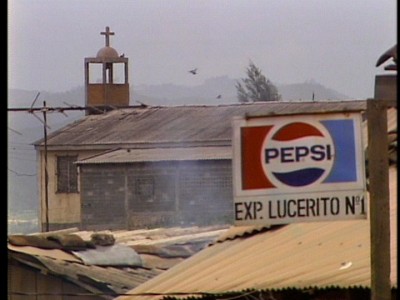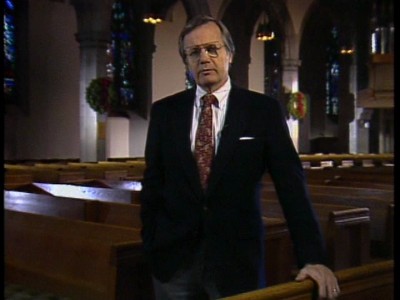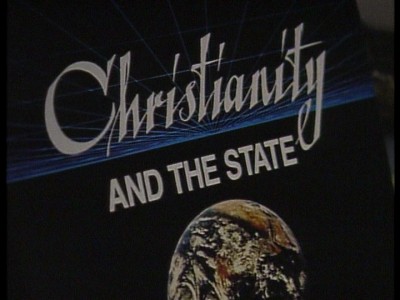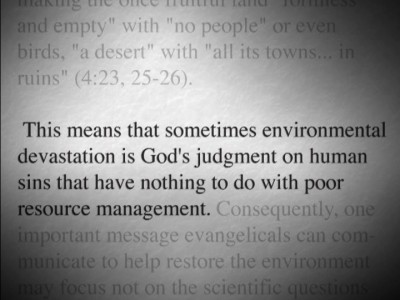| Reviews & Columns |
|
Reviews DVD TV on DVD Blu-ray 4K UHD International DVDs In Theaters Reviews by Studio Video Games Features Collector Series DVDs Easter Egg Database Interviews DVD Talk Radio Feature Articles Columns Anime Talk DVD Savant Horror DVDs The M.O.D. Squad Art House HD Talk Silent DVD
|
DVD Talk Forum |
|
|
| Resources |
|
DVD Price Search Customer Service #'s RCE Info Links |
|
Columns
|
|
|
Bill Moyers: God and Politics
First aired on public television in 1987, at the height of the 12-year Reagan-Bush era and in the thick of a rapidly consolidating alliance between Christian fundamentalists and the United States' political right wing, Bill Moyers's three-part series on the intertwining of religion and politics thoughtfully takes on events and issues very much of its time: Iran-Contra, the Cold War's Central American manifestation, the rise of the suburban mega-church and televangelism. But what makes God and Politics so immediately unsettling, and its fascinating and in-depth examination of its subject so enlightening and relevant for today, is that most of the core overlaps and conflicts between secular society, religion, and politics explored by Moyers back then continue to be just as relevant to American (and world) politics, if not more so, in 2011.

The first episode, "The Kingdom Divided," introduces the ongoing binary opposition of the series--established, "mainline," generally moderate and/or apolitical Christian denominations in the U.S. vs. a highly politicized, right-wing, non-denominational evangelical fundamentalism--as exemplified by various Christian missionaries and their work in conflict-ridden Latin American states, specifically Nicaragua and Honduras. Moyers outlines the geopolitical situation in accessible terms, and representatives of two groups--fundamentalist missionaries closely aligned with the Reagan administration and its support of the right-wing Contras, and "liberation theology" missionaries who work alongside the leftist Sandinista government--are interviewed, explaining their views regarding the purpose of their missions and offering their answers to the question, is it more important--more "Christian"--to save souls through charity or to advocate for the replacement of unjust systems with policies of economic and social justice? The justifications and thought processes from each side are given a patient hearing (this is by far the longest episode of the series) and offer substantial food for thought. Moyers also includes ample footage of the suffering Nicaraguan and Honduran people to underline their hunger for some kind of intervention or "salvation," and the urgency of the debate as it pertains to that troubled region.

The next part, "The Battle for the Bible," has a personal urgency for Moyers himself; raised a Baptist in Texas, he, like many Baptists (whose wide-ranging adherents have included, as he notes, "Martin Luther King, Jr., and Jerry Falwell; Jesse Helms and Jesse Jackson"), is befuddled by the politicization and regressive theological literalism advocated by a fundamentalist faction within The Southern Baptist Convention, which at that point was completing its takeover of Baptistry in the U.S., creating the dogmatically ultraconservative force familiar to us today. While still measured and respectful, giving voice to all sides of the debate through a half-dozen or so interviews, Moyers cannot avoid expressing his concern over the divisiveness now present in a denomination he no longer recogonizes. Changes like what amount to loyalty oaths for Baptist seminary professors and conservative stances all "real" Baptists are expected to embrace are vociferously defended by fundamentalist reformers at the same time they are the cause of the disappointment and alienation expressed by the many Baptist faithful who no longer recognize their church, which has become what amounts to a religious auxiliary of and advisor to the Republican Party.
In the concluding chapter, "On Earth as It Is in Heaven," Moyers turns his cameras and commentary to "Christian reconstructionism," a strain of the faith that denies the legitimacy of a separation between church and state, demanding the elimination of pluralism and making a literal, legal and civic reality of the debatable concept that the United States is a "Christian nation." The not-yet-official term "Christian coalition" is presciently used by some of the activists themselves to describe the variously fundamentalist and/or reconstructionist supporters of 700 Club host and cable-TV tycoon Pat Robertson for President. With an admirable patience and evenness of tone, Moyers asks the series's most probing and challenging questions of some surprisingly calm and articulate reconstructionist spokesmen, including the movement's "godfather," Rousas John Rushdoogy, and the Rev. Joseph Morecraft of Georgia, who claims, "The choice is Christian morality or no morality." He also interviews other prominent fundamentalists who cannot bring themselves to go as far as the reconstructionists, allowing us to deduce for ourselves that if former Nixon adviser and criminal/current born-again author and radio personality Charles Colson is the most rational voice in a group of interviewees, it must be an unusually extreme group, indeed.

As a personality, Moyers has always made something of an easy target for the zippier, more ironic SNL sensibility, and it may be true that his soft-spoken, earnest, syncretic, fact-relating style is blandly PBS-neutral and soporifically calm compared to.... Well, compared to what? This series is a welcome reminder that our current, shouty, high-turnover 24-hour news cycle--only an apple in the eye of Rupert Murdoch and Ted Turner in 1987--is not nearly as enlightening, relevant, or "fair and balanced" as it wants us to believe. Moyers is dignified and lucid. He is proudly, refreshingly committed to documentary as information and news as news, not news as entertainment. But that is not to say that his presentational style is not engaging and absorbing, or his straightforwardly constructed talking-heads-and-background editing is not dynamic or well-done. And, while entirely upfront about his modestly secular-humanist-pluralist point of view, he is in practice almost obsessively egalitarian, giving a voice and listening with sincere respect to his ideological opposition, and therefore markedly more "fair and balanced" than any cable news network that feels obligated to dissemble its unavoidable biases. One has the all-too-rare feeling, while taking in God & Politics, of being offered something both immediately diverting and truly, substantially informative. Moyers is in the honorable fair-play tradition, now long faded but no less essential, of Good Night, and Good Luck hero Edward R. Murrow; his genuine curiosity and integrity, palpable in every moment of this important, prescient series, make it worth the attention of anyone wanting to educate themselves about the right-wing evangelical phenomenon that is still a pressing fact of political life in the United States.
THE DVD:
Athena Learning, God & Politics's distributor, prefaces the program (presented in the 4:3 full-screen aspect ratio standard for all television at the time) with a disclaimer about the original source materials of the program, videotape circa 1987, which means blur, glare, and a not exactly felicitous relationship between actual and taped light and color. Certainly, this technology appears primitive in light of current broadcasts of this type, most of which are done with digital video. Still, the dated visual qualities of the program are as well-preserved as possible (think of the Criterion Golden Age of Television box set's accurate, if hardly pristine, presentation of its great, important, but very low-definition 1950s live broadcasts), and the DVD presentation is surely of at least equal quality to that attained by adjusting the rabbit ears upon its original broadcast.
Sound:The sound is nothing special, but the sonic elements here offer more to "clean up" than did the visual dimension of the program, and the clear, well-balanced 2.0 stereo soundtrack means that viewers of the series on DVD will be getting much higher quality sound than most who tuned in when it aired.
Extras:The wide-ranging extras, each of which expands in some way upon the main program's religion-and-politics theme, are extensive enough to fill an entire bonus disc:
A 2006 installment of Moyers's Moyers on America series, Is God Green?, takes us back for another look at the fundamentalist Christian movement, now at the height of its political power. Instead of revisiting the split between fundamentalists and mainline Christians, Moyers explores a surprising division within the evangelical movement over the issue of global warming. He introduces the topic with documentation of West Virginian born-again believers who cannot ignore the devastation of the coal mining industry that affects them directly, as well as members of a fundamentalist church in Boise, Idaho whose pastor, initially fearful of "coming out" as an environmentalist, now has a congregation that spends its spare time partnering with the local Forest Service to plant trees and renew land destroyed by industry. He wraps things up by crosscutting interviews with two right-wingers who find themselves in unexpected opposition: F. Calvin Beisner, a member of an ExxonMobil-funded right-wing think tank and a believer that Hurricane Katrina, the eruption of Mt. St. Helens, and global warming are "God's will"; and Richard Cizic, an ultraconservative spokesperson for the National Association of Evangelicals who has brought the wrath of the right-wing establishment down on himself by dissenting from the party line on global warming. It's fascinating on both the political and socio-cultural levels, and a nice complement to the 1987 series.

Also included are three segments taken from Moyers's NOW with Bill Moyers series: a "talking about God" roundtable discussion featuring Muslim, Christian, and atheist experts surveying and commenting on the post-09/11 religious and political landscapes in the U.S.; an interview with agnostic author Wendy Kaminer on the relationship between secularism and religious liberty; and a 2004 interview with Sister Joan Chittister, a feisty nun ferociously opposed to U.S. invasion and occupation of Iraq and appalled at the prospect of a second George W. Bush presidential term.
Text-centered extras include on-screen biographies of the United States's higher-profile right-wing religious leaders (Dr. James Dobson, Rev. Jerry Falwell, Rev. Pat Robertson, etc.) and Moyers himself, as well as a 12-page booklet packed with information and statistics on the history of American politics in relation to its Christian traditions.
FINAL THOUGHTS:Religion and politics may be the two topics traditionally forbidden at the American dinner table, but with the steadfastly even-handed Bill Moyers facilitating a far-ranging and conscientiously inclusive discussion on the points where they intersect in the nation's political life, rancor is kept to a minimum; no matter what your own politics or beliefs are, you can come away from God & Politics with more knowledge and perspective, without feeling either bullied or patronized. It's a timely reminder, in a period when it's constantly under attack, of the specific value of public broadcasting--of the depth, focus, and thoughtfulness that become possible in TV programming when bigger audience shares and revenues are not the central concern. Highly Recommended.
|
| Popular Reviews |
| Sponsored Links |
|
|
| Sponsored Links |
|
|
| Release List | Reviews | Shop | Newsletter | Forum | DVD Giveaways | Blu-Ray | Advertise |
|
Copyright 2024 DVDTalk.com All Rights Reserved. Legal Info, Privacy Policy, Terms of Use,
Manage Preferences,
Your Privacy Choices | |||||||













